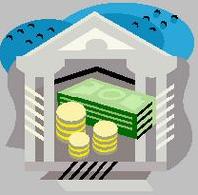
 |
|
| Financial Terms | |
| Foreign equity market |
|
Information about financial, finance, business, accounting, payroll, inventory, investment, money, inventory control, stock trading, financial advisor, tax advisor, credit.
Main Page: tax advisor, accounting, payroll, inventory, business, credit, financial advisor, investment, |
Definition of Foreign equity market
Foreign equity marketThat portion of the domestic equity market that represents issues floated by foreign companies.
Related Terms:DLOM (discount for lack of marketability)an amount or percentage deducted from an equity interest to reflect lack of marketability. QMDM (quantitative marketability discount model)model for calculating DLOM for minority interests r the discount rate All equity rateThe discount rate that reflects only the business risks of a project and abstracts from the Asset/equity ratioThe ratio of total assets to stockholder equity. Auction marketsmarkets in which the prevailing price is determined through the free interaction of Bear marketAny market in which prices are in a declining trend. Black marketAn illegal market.  Bottom-up equity management styleA management style that de-emphasizes the significance of economic Brokered marketA market where an intermediary offers search services to buyers and sellers. Bull marketAny market in which prices are in an upward trend. Bulldog marketThe foreign market in the United Kingdom. Capital marketThe market for trading long-term debt instruments (those that mature in more than one year). Capital market efficiencyReflects the relative amount of wealth wasted in making transactions. An efficient Capital market imperfections viewThe view that issuing debt is generally valuable but that the firm's Capital market line (CML)The line defined by every combination of the risk-free asset and the market portfolio. Cash marketsAlso called spot markets, these are markets that involve the immediate delivery of a security  Common marketAn agreement between two or more countries that permits the free movement of capital Common stock/other equityValue of outstanding common shares at par, plus accumulated retained Common stock marketThe market for trading equities, not including preferred stock. Complete capital marketA market in which there is a distinct marketable security for each and every Controlled foreign corporation (CFC)A foreign corporation whose voting stock is more than 50% owned Corner A MarketTo purchase enough of the available supply of a commodity or stock in order to Dealer marketA market where traders specializing in particular commodities buy and sell assets for their Debt/equity ratioIndicator of financial leverage. Compares assets provided by creditors to assets provided Debt marketThe market for trading debt instruments. Deferred equityA common term for convertible bonds because of their equity component and the Derivative marketsmarkets for derivative instruments. Direct search marketBuyers and sellers seek each other directly and transact directly. Domestic marketPart of a nation's internal market representing the mechanisms for issuing and trading Dual syndicate equity offeringAn international equity placement where the offering is split into two Efficient capital marketA market in which new information is very quickly reflected accurately in share Efficient Market HypothesisIn general the hypothesis states that all relevant information is fully and Either-way marketIn the interbank Eurodollar deposit market, an either-way market is one in which the bid Emerging marketsThe financial markets of developing economies. Equilibrium market price of riskThe slope of the capital market line (CML). Since the CML represents the EquityRepresents ownership interest in a firm. Also the residual dollar value of a futures trading account, Equity capAn agreement in which one party, for an upfront premium, agrees to compensate the other at Equity claimAlso called a residual claim, a claim to a share of earnings after debt obligation have been Equity collarThe simultaneous purchase of an equity floor and sale of an equity cap. Equity contribution agreementAn agreement to contribute equity to a project under certain specified Equity floorAn agreement in which one party agrees to pay the other at specific time periods if a specific Equity kickerUsed to refer to warrants because they are usually issued attached to privately placed bonds. Equity marketRelated:Stock market Equity multiplierTotal assets divided by total common stockholders' equity; the amount of total assets per Equity optionsSecurities that give the holder the right to buy or sell a specified number of shares of stock, at Equity swapA swap in which the cash flows that are exchanged are based on the total return on some stock Equity-linked policiesRelated: Variable life EquityholdersThose holding shares of the firm's equity. Eurocurrency marketThe money market for borrowing and lending currencies that are held in the form of Euroequity issuesSecurities sold in the Euromarket. That is, securities initially sold to investors Excess return on the market portfolioThe difference between the return on the market portfolio and the External marketAlso referred to as the international market, the offshore market, or, more popularly, the Fair market priceAmount at which an asset would change hands between two parties, both having Federal funds marketThe market where banks can borrow or lend reserves, allowing banks temporarily Financial marketAn organized institutional structure or mechanism for creating and exchanging financial assets. Fixed-income marketThe market for trading bonds and preferred stock. Foreign banking marketThat portion of domestic bank loans supplied to foreigners for use abroad. Foreign bondA bond issued on the domestic capital market of anther company. Foreign bond marketThat portion of the domestic bond market that represents issues floated by foreign Foreign currencyforeign money. Foreign currency optionAn option that conveys the right to buy or sell a specified amount of foreign Foreign currency translationThe process of restating foreign currency accounts of subsidiaries into the Foreign direct investment (FDI)The acquisition abroad of physical assets such as plant and equipment, with Foreign exchangeCurrency from another country. Foreign exchange controlsVarious forms of controls imposed by a government on the purchase/sale of Foreign exchange dealerA firm or individual that buys foreign exchange from one party and then sells it to Foreign exchange riskThe risk that a long or short position in a foreign currency might have to be closed out Foreign exchange swapAn agreement to exchange stipulated amounts of one currency for another currency Foreign marketPart of a nation's internal market, representing the mechanisms for issuing and trading Foreign market betaA measure of foreign market risk that is derived from the capital asset pricing model. Foreign Sales Corporation (FSC)A special type of corporation created by the Tax Reform Act of 1984 that Foreign tax creditHome country credit against domestic income tax for foreign taxes paid on foreign Forward marketA market in which participants agree to trade some commodity, security, or foreign Fourth marketDirect trading in exchange-listed securities between investors without the use of a broker. Futures marketA market in which contracts for future delivery of a commodity or a security are bought or sold. GEMs (growing-equity mortgages)Mortgages in which annual increases in monthly payments are used to Gray marketPurchases and sales of eurobonds that occur before the issue price is finally set. Index and Option Market (IOM)A division of the CME established in 1982 for trading stock index Intermarket sectorspread The spread between the interest rate offered in two sectors of the bond market for Intermarket spread swapsAn exchange of one bond for another based on the manager's projection of a Internal marketThe mechanisms for issuing and trading securities within a nation, including its domestic Internally efficient marketOperationally efficient market. International marketRelated: See external market. International Monetary Market (IMM)A division of the CME established in 1972 for trading financial Intramarket sector spreadThe spread between two issues of the same maturity within a market sector. For Inverted marketA futures market in which the nearer months are selling at price premiums to the more Investor's equityThe balance of a margin account. Related: buying on margin, initial margin requirement. Leveraged equityStock in a firm that relies on financial leverage. Holders of leveraged equity face the Locked marketA market is locked if the bid = ask price. This can occur, for example, if the market is Long-term debt to equity ratioA capitalization ratio comparing long-term debt to shareholders' equity. Make a marketA dealer is said to make a market when he quotes bid and offered prices at which he stands Mark-to-marketThe process whereby the book value or collateral value of a security is adjusted to reflect Marked-to-marketAn arrangement whereby the profits or losses on a futures contract are settled each day. Market capitalizationThe total dollar value of all outstanding shares. Computed as shares times current Market capitalization rateExpected return on a security. The market-consensus estimate of the appropriate Market clearingTotal demand for loans by borrowers equals total supply of loans from lenders. The market, Market conversion priceAlso called conversion parity price, the price that an investor effectively pays for Market cycleThe period between the 2 latest highs or lows of the S&P 500, showing net performance of a Market impact costsAlso called price impact costs, the result of a bid/ask spread and a dealer's price concession. Related to : financial, finance, business, accounting, payroll, inventory, investment, money, inventory control, stock trading, financial advisor, tax advisor, credit. |